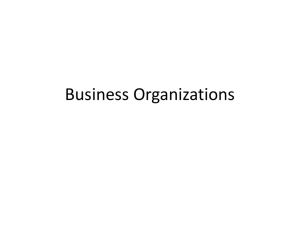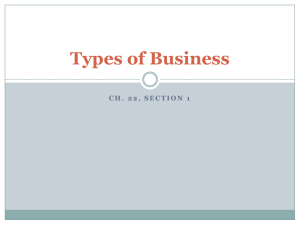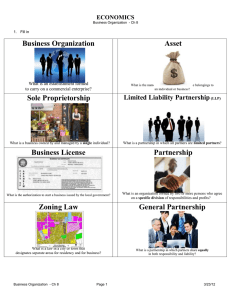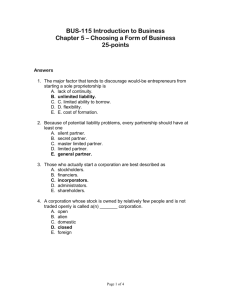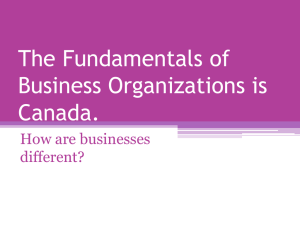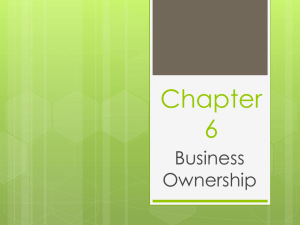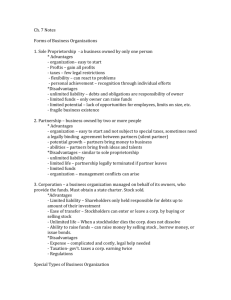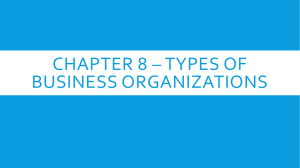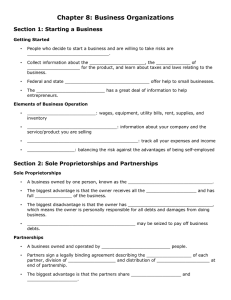Chapter 8: Business Organizations
advertisement
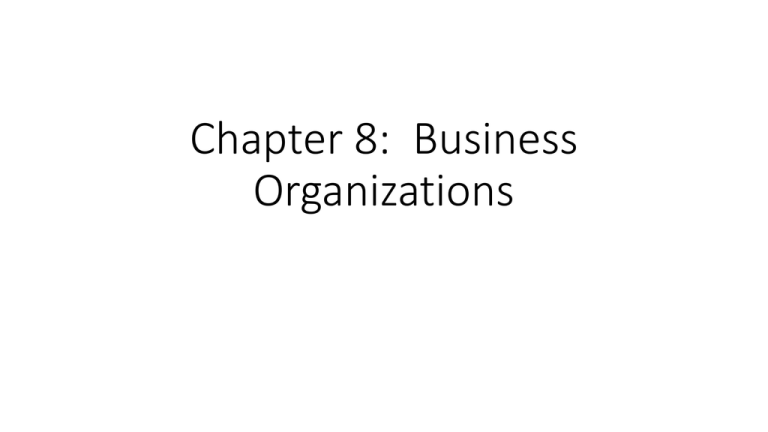
Chapter 8: Business Organizations Section 1: Starting a Business Think about starting a business: • Would you want to go at it on your own or go into business with someone else? • How would you tell people about your business? (be specific) Remember • Anyone who takes a risk to start a business is an entrepreneur • • • • Must decide what to sell Gather elements to start business Learns about laws, regulations, tax codes Small business incubators (gov’t agencies) help provide low rent buildings, advice on starting a new business Remember • Elements of business operation • • • • Expenses: Advertising: Record keeping: Risk: Remember • Receipts: records to keep track of sales and expenses • Inventory: ready supply of goods necessary for operation of business • Start up: process of starting a business Chapter 8 Section 2: Sole Proprietorships and Partnerships Think • Have you ever had an assignment to independently and thought, “This would be so much easier if someone was here to help.”? • Or, have you paired up with a friend to do a project and wished you would have done it on your own? Why? Remember: • Sole proprietorship: business owned by one person • Proprietor: Person who owns a business • Assets: all items legally owned by business • Partnership: business owned and operated by 2 or more people • Limited partnership: arrangement where one or more of the people involved have limited liability, but do not get to make management decisions • Joint venture: temporary partnership created for a specific purpose Remember: • Advantages of a Sole Proprietorship • • • • • • Owner gets all profits Owner makes all decisions Business is less complicated Fewer gov’t regulations Lower taxes Easy to obtain credit Remember: • Disadvantages of a Sole Proprietorship • • • • • • • Responsible for all losses Unlimited liability Owner must sell personal assets to pay bills for business No help in making decisions Time consuming Rely on own funds If owner dies, goes bankrupt, or is unable to work- business will fail Remember: • Advantages of Partnership • • • • • • • Losses are shared More efficient than sole proprietorships Each partner brings skills Fewer gov’t regulations Lower taxes More capital from multiple partners Able to borrow money Remember: • Disadvantages of Partnership • • • • • • Share profits Unlimited liability for each partner Decision making is slow Disagreements can lead to problems Money borrowed is based on assets of business and partners If one partner leaves, partnership has to be reorganized Chapter 8 section 3: The Corporate World and Franchises Think: • Have you ever been a member of a club or team? If so, what was it called? (If not, make one up) • How was your organization created? • Did you raise money to pay for activities? • Who selected your leaders? What is a Corporation? Class discussion Remember: • A corporation is a business owned by many people but treated like a person by law • It can own property • It must pay taxes • It can enter into contracts Remember: • Individuals by stock or a specific part of a corporation • An owner, or stockholder, has limited liability and is only responsible for their own investment • corporations have to submit articles of incorporation in the state where the corporation will have its headquarters (register basic info) • The state issues a corporate charter or license to allow corporation to operate Remember: • People who buy common stock in the corporation own part of it and vote on what to do with future profits • These stockholders receive a dividend or portion of the corporation’s profits • Preferred stock holders do not have voting rights, but get a portion of future profits before others Remember: • A franchise is a business that sells the rights to its name and products to another company • Examples: Remember: • Advantages of corporations • Owners (stockholders) do not have to devote time to the company • Limited liability • If sued or bankrupted, creditors cannot take person property form stockholders • Responsibility divided among many • Decisions made by trained individuals • Draw on resources of investors • Can continue indefinitely if profitable Remember: • Disadvantages of corporations • Decision making can be slow • Interests of those running the corporation (board of directors/trustees) may not match those of stockholders • Federal gov’t and state/local taxes apply to corporate profits • Dividends are taxed again as personal income • Most stockholders do not have a say in how corporation is run
